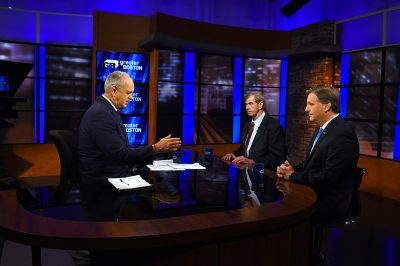Massachusetts Secretary of State incumbent Democrat William Galvin and Republican challenger Anthony Amore faced off in a tense debate for the seat Monday, often trampling over one another to get their ideas out.

The heated exchange, moderated by WGBH’s Jim Braude, lasted for about 30 minutes and covered election security, President Donald Trump’s policies and voting frequency.
Massachusetts does not impose term limits on the secretary of state position, and Galvin, who is running for his 25th year and seventh term in the position, was met with criticism by Amore.
Amore called the state’s security system under Galvin “antiquated,” noting that it has been in place for 12 years.
“Twelve years old is too old … The only reason that you’re saying it works is because nothing’s happened yet,” he said. “That is the worst approach to security imaginable.”
In a discussion on voting practices in Massachusetts, Braude asked the candidates to explain their stances on the prospect of introducing same-day voter registration to the state.
“It requires commitment on the part of the legislature, first of all, to approve it, but also the monies to support it,” Galvin said, adding later, “I think it is a good thing. It is important that we make voting as flexible as possible.”
Amore, who previously served as a Department of Homeland Security official before assuming his current job as the director of security and chief investigator at the Isabella Stewart Gardner Museum, said he did not support same-day voter registration.
He expressed concern regarding the ability of people to commit voter fraud or vote despite not being a citizen.
“Well I think it’s the future, but I think right now we can’t,” Amore said, “I’m not convinced it can be done securely.”
Amore said he believes voter identification is a necessity for elections.
“In Indiana, when they implemented voter ID, voter turnout increased,” he said, “It didn’t decrease. It’s not a suppression effort. It adds confidence to people who go to vote.”
Galvin refuted Amore’s proposals on voting.
“Wherever ID has been required, it has diminished turnout,” Galvin said, “and especially affected minority voters.”
Amore said he opposed automatic voter registration for a similar reason.
“[I]’m not convinced that the way it’s implemented now,” Amore said, “that people can be sure that when you go the registry, you’re proven that you’re a citizen and that you’re eligible to vote.”
Galvin reacted to this opposition, arguing that voters have a lot of confidence that their vote is secure and is accounted for.
Responding to Amore’s criticism that he had not been presenting the public or stakeholders with a strategic plan for his office, Galvin said one of the most important actions he was planning to take was counting people for the 2020 census.
“… Given your anti-immigrant position, documented by your multiple tweets in support of Donald Trump’s immigration plan, [that] is going to make Massachusetts a very difficult place to count and probably cost us a congressional seat and a lot of local aid,” Galvin said of Amore.
Amore denied Galvin’s accusations that he was a Trump supporter and anti-immigrant, calling these assertions “dishonest.”
Galvin, however, was quick to provide evidence for his claim and respond to Amore’s denials.
“I have your tweets, I have your tweets,” Galvin said. “You were talking about the Muslim ban, how wonderful it is … I have the tweets.”
Amore, talking over Galvin, continued to criticize the accusation that he was anti-immigrant and anti-immigration.
“I’ve done more for the immigrant population in this state than you ever have, believe me,” Amore said. “I’ve brought refugees into this country.”
Another topic that dominated the debate was skepticism from both candidates of the other’s past records of commitment to their duties.
Galvin said Amore had failed to vote in 14 elections. Braude backed up this point, citing a Wicked Local article, mentioning that in his two or three year term as a town meeting member, Amore only attended one and a half out of the 10 meetings.
Galvin also came under criticism for his political participation. Amore said Galvin did not attend Massachusetts Historical Commission meetings even though he is chair of the commission.
Galvin, who argued he does not neglect his duties in the Massachusetts Historical Commission, said he worked from his office as a member of the commission. He also rejected Amore’s claim that he is paid to attend the commission meetings.
The debate got even more heated the longer it lasted and ended with name calling from both of the candidates.
“You’re a liar,” Amore said to Galvin at the end of the debate.
“And you’re a faker,” Galvin responded.
Massachusetts residents can cast their votes early until Nov. 2 in most counties. Official Election Day is on Nov. 6.



